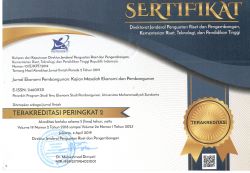Identifying factors influencing rice production and consumption in Indonesia
Abdul Bashir(1*), Saadah Yuliana(2)(1) Universitas Sriwijaya
(2) Universitas Sriwijaya
(*) Corresponding Author
Abstract
Keywords
Full Text:
PDFReferences
Antle, J. M. (1984). Human capital, infrastructure, and the productivity of Indian rice farmers. Journal of Development Economics, 14(1), 163–181. https://doi.org/10.1016/0304-3878(84)90048-8
Apostolidou, I., Kontogeorgos, A., Michailidis, A., & Loizou, E. (2014). The Role of Agriculture in Economic Growth: A Comparison of Mediterranean and Northern Views in Europe. International Journal of Economic Sciences and Applied Research, 7(3), 81–102.
Azwardi, Bashir, A., Adam, M., & Marwa, T. (2016). The effect of subsidy policy on food security of rice in Indonesia. International Journal of Applied Business and Economic Research, 14(13), 9009–9022.
Bagamba, F., Burger, K., & Kuyvenhoven, A. (2007). Determinants of Smallholder Farmer Labour Allocation Decisions in Uganda. In Paper prepared for presentation at the 106th seminar of the EAAE, 25-27 October 2007 (pp. 1–22). Montpellier, France.
Barro, R. J., & Lee, J. W. (2013). A new data set of educational attainment in the world. Journal of Development Economics (Vol. 104). https://doi.org/10.1016/j.jdeveco.2012.10.001
Bordey, F. H. (2010). The Impacts of Research on Philippine Rice Production. In University of Illinois at Urbana-Champaign (pp. 1–137).
BPS. (2016). Statistical Yearbook of Indonesia in various editions. (BPS, Ed.). Jakarta: Badan Pusat Statistik.
Bren d’Amour, C., Reitsma, F., Baiocchi, G., Barthel, S., Güneralp, B., Erb, K.-H., … Seto, K. C. (2016). Future urban land expansion and implications for global croplands. Proceedings of the National Academy of Sciences, 114(34), 8939–8944. https://doi.org/10.1073/pnas.1606036114
Chen, A. Z., Huffman, W. E., & Rozelle, S. (2003). Technical Efficiency of Chinese Grain Production: A Stochastic Production Frontier Approach. In American Agricultural Economics Association Annual Meeting (pp. 1–29). Montreal, Canada.
Clapp, J. (2017). Food self-sufficiency: Making sense of it, and when it makes sense. Food Policy, 66, 88–96. https://doi.org/10.1016/j.foodpol.2016.12.001
Clarete, R. L., Adriano, L., & Esteban, A. (2013). Rice trade and price volatility: Implications on ASEAN and global food security. ADB Economics Working Paper Series, 368(368), 1–35.
Dawe, D. (2000). The contribution of rice research to poverty alleviation. Studies in Plant Science (Vol. 7). Elsevier Masson SAS. https://doi.org/10.1016/S0928-3420(00)80003-8
Dickey, D. A., & Fuller, W. A. (1979). Distribution of the Estimators for Autoregressive Time Series With a Unit Root. Journal of the American Statistical Association, 74(366a), 427–431.
Edriss, A., Tchale, H., & Wobst, P. (2004). The impact of labor market liberalization on maize productivity and rural poverty in Malawi. In Policy Analysis for Sustainable Agricultural Development (PASAD) (pp. 1–19). Germany: University of Bonn. Retrieved from http://www.pasad.uni-bonn.de/Edriss_et_al_The_Impact.pdf
Ekou, N. (2015). The Effect of Primary Education on Maize Productivity in Ivory Coast. European Scientific Journal, 11(25), 203–217.
Fairhurst, T. H., & Dobermann, a. (2002). Rice in the Global Food Supply. Better Crops International, 16(May), 8–11.
Fakayode, S. B., Omotesho, O. A., & Omoniwa, A. E. (2010). Economic Analysis of Rice Consumption Patterns in Nigeria. J. Agr. Sci. Tech., 12(2), 135–143.
FAO. (2009). The State of Food and Agriculture. Livestock in the Balance. https://doi.org/ISBN: 978-92-5-107671-2 I
Felipe, J., & Adams, G. F. (2005). A Theory of Production. The estimation of the Cobb-Douglas function: a retrospective view. Eastern Economic Journal, 31(3), 427–445. https://doi.org/-
FRED. (2018). Index of Human Capital per Person for Indonesia. California: Federal Reserve Bank of St. Louis. Retrieved from https://fred.stlouisfed.org/series/HCIYISIDA066NRUG
Grochowska, R., & Kosior, K. (2013). Agricultural policies in the context of regional and global food security concerns – the case of the Asian region. In Institute of Agricultural and Food Economics (pp. 25–33).
Gujarati, D. N. (2004). Basic Econometrics. United States: The McGraw−Hill Companies.
Im, K. S., Pesaran, M. H., & Shin, Y. (2005). Testing for seasonal unit roots in heterogeneous panels. Journal of Econometrics, 115(1), 53–74. https://doi.org/10.1016/j.econlet.2004.06.018
Inoue, S., Okae, T., & Akashi, K. (2015). Rice Policy Trends in Southeast Asian Countries: Thailand, Vietnam and Indonesia. PRIMAFF Review, 66(7), 4–5.
Jha, S., Kubo, K., & Ramaswami, B. (2016). International trade and risk sharing in the global rice market: The impact of foreign and domestic supply shocks. Asian Development Review, 33(1), 162–182. https://doi.org/10.1162/ADEV_a_00064
Kea, S., Li, H., & Pich, L. (2016). Technical Efficiency and Its Determinants of Rice Production in Cambodia. Economies, 4(4), 1–22. https://doi.org/10.3390/economies4040022
Koirala, K. H., Mishra, A. K., & Mohanty, S. (2013). Determinants of Rice Productivity and Technical Efficiency in the Philippines. Southern Agricultural Economics Association (SAEA) Annual Meeting, (October 2015), 1–16. https://doi.org/10.13140/2.1.3275.1360
Levin, A., Lin, C. F., & Chu, C. S. J. (2002). Unit root tests in panel data: Asymptotic and finite-sample properties. Journal of Econometrics, 108(1), 1–24. https://doi.org/10.1016/S0304-4076(01)00098-7
Llanto, G. M. (2012). The Impact of Infrastructure on Agricultural Productivity. In Discussion Paper (pp. 469–486). Philippine Institute for Development Studies. Retrieved from http://www.scopus.com/inward/record.url?eid=2-s2.0-0028580356&partnerID=tZOtx3y1
Malian, A. H., Sudi, M., & Mewa, A. (2007). Faktor-faktor yang mempengaruhi Produksi, Konsumsi dan Harga Beras serta Inflasi. Bahan Makanan. Jurnal Agro Ekonomi, 22(2), 119–146.
Micheal, R. T. (1972). Human Capital and Consumption: The Theoretical Framework. In The effect of education on efficiency in Consumption (Vol. Chapter I, pp. 7–13). Retrieved from www.nber.org/books/mich72-1%5Cnwww.nber.org/chapters/c3514
Milovanovic, V., & Smutka, L. (2017). Asian countries in the global rice market. Acta Universitatis Agriculturae et Silviculturae Mendelianae Brunensis, 65(2), 679–688. https://doi.org/10.11118/actaun201765020679
Nuryanti, S. (2005). Analisa keseimbangan sistem penawaran dan permintaan beras di indonesia. Jurnal Agro Ekonomi, 23(1), 71–81.
Phillips, P. C. B., & Perron, P. (1988). Testing for a unit root in time series regression. Biometrika, 75(2), 335–346.
Rejesus, R. M., Mohanty, S., & Balagtas, J. V. (2012). Forecasting Global Rice Consumption. Working Paper. North Carolina State University.
Reyes, C. M., Sobrevinas, A. B., Bancolita, J., & Jesus, J. De. (2009). Analysis of the Impact of Changes in the Prices of Rice and Fuel on Poverty in the Philippines. In Discussion Paper (pp. 1–73). Philippine Institute for Development Studies.
Rosegrant, M. W., & Sulser, T. (2002). Rice Price Crisis: Causes, Impacts, and Solutions. Asian Journal of Agriculture and Development, 7(2), 1–15.
Satterthwaite, D., McGranahan, G., & Tacoli, C. (2010). Urbanization and its implications for food and farming. Philosophical Transactions of the Royal Society B: Biological Sciences, 365(1554), 2809–2820. https://doi.org/10.1098/rstb.2010.0136
Shaikh, S. A., & Ahmed, M. (2016). Determinants of Rice Productivity: An Analysis of Jaffarabad District –Balochistan (Pakistan). European Scientific Journal, 12(13), 41–50. https://doi.org/10.19044/esj.2016.v12n13p41
Tiffin, R., & Irz, X. (2006). Is agriculture the engine of growth? Agricultural Economics, 35, 79–89.
Timmer, C. P. (2013). Food Security in Asia and the Pacific: The Rapidly Changing Role of Rice. Asia & the Pacific Policy Studies, 1(1), 73–90. Retrieved from http://doi.wiley.com/10.1002/app5.6%5Cnpapers2://publication/doi/10.1002/app5.6
Turok, I., & McGranahan, G. (2013). Urbanization and economic growth: The arguments and evidence for Africa and Asia. Environment and Urbanization, 25(2), 465–482. https://doi.org/10.1177/0956247813490908
Wohlgenant, M. K., & Hahn, W. F. (1982). Dynamic Adjustment in Monthly Consumer Demands for Meats. American Journal of Agricultural Economics, 64(3), 553–557. https://doi.org/10.2307/1240649
Article Metrics
Abstract view(s): 7579 time(s)PDF: 4102 time(s)
Refbacks
- There are currently no refbacks.

















